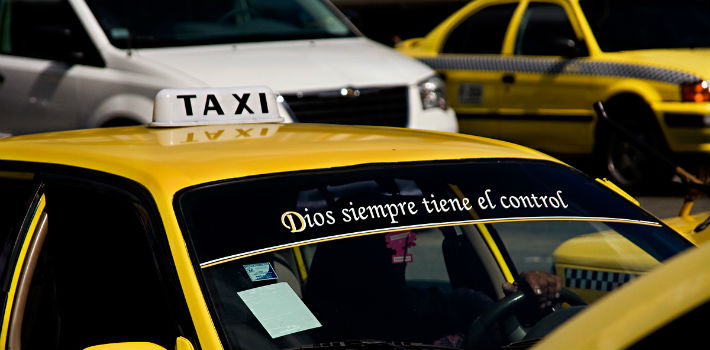Here is a great article by Félix Javier Puga that appeared in the Panam Post on Panama’s transportation system and the challenges that it faces.
Panama is a country that follows its own path. In recent elections, we not only rejected the populist progressive candidate, but we made his party disappear. While the first world debates whether printing money will help ease recession, we worry about only growing at a rate of 6 percent per year, and don’t even have a central bank.
Sometimes doing things the opposite way around has its benefits. But while various efforts are underway to legislatively punish Uber for offering a cheaper personal transport service, in Panama the issue barely exists. In our country, Uber is more expensive than regular taxis, and its clients are those who previously never used taxis.
It’s perhaps to Uber’s benefit that it stays under the radar, as government regulation has created a disastrous transport system that serves the interests of union bosses and managers at the expense of users.
For those who are yet to hear about it, Uber is a free application for iOS and Android smartphones and tablets which offers a transport network, connecting passengers with nearby registered vehicles.
The client can see the vehicles available nearby and select the closest. The name and the conductor of the driver will appear on their screen, next to the model of their car. The vehicle picks up the user and takes them to their destination, with the transaction handled through a previously registered credit card: no money changes hands.
In the world of private enterprise, poor services simply disappear.
At the end of the journey, the app asks the client to rate their driver, offering drivers an enormous incentive to drive safely and without going over the speed limit. For this reason, the Uber experience rates far better than the unpleasant odyssey thousands of Panamanians face daily when forced to use yellow cabs.
Uber’s superiority over the disastrous Panamanian transport system is evident when we consider wave after wave of regulation, backed by unscrupulous politicians who ignore the interests of those who use it.
It’s no secret that our national transport arrangements are designed to benefit the select few. A system of quotas issued by the Transport Authority decides who can or can’t be a transport provider, regardless of whether they comply with the requirements of whatever administration happens to be in power.
This is no accident, given that many national deputies are owners of transport unions, and shareholders of registered transport companies. Routes, areas, and tariffs are predetermined by the politically influential, quashing any hopes of healthy competition leading to a user-oriented service.
We’ve ended up with taxis that don’t pick up passengers, pile multiple passengers on separate journeys into their cars when they do, and that drive like maniacs. Because they don’t receive a fixed wage, stories are constantly unearthed of drivers being involved in criminal activities. This is regulated transport in Panama.
This predicament comes from a mistaken concept of transport as a right and not a service. If it were considered the other way round, we would prioritize the interests of the client, and not those of the workers and bosses.
By way of illustration, let’s make a comparison. Public transport and a gym both have several things in common. Both provide a service, and both have to comply with regulations to operate.
In a gym that makes its clients the priority, they’re focused on client well-being. To attend, you simply turn up, give your payment details, and enjoy — and maybe obey a few rules, like bringing your own towel, and checking out your personal trainer’s physique for no longer than three seconds at a time.
But if the gym functioned like regulated transport, you’d have to fill out reams of forms, providing multiple copies signed by a notary. You’d pay a regular amount that wouldn’t even guarantee you entry, clandestinely subsidizing the cross-fit trainer despite never using her services, and funding the line dancing instructor despite never being likely to show up to his class: you’ve got some self-respect, after all.
And then you’d be told that you can only use the gym for three hours in the afternoon, and you have to wear full fuchsia uniform as per the manager’s regulations. You’d try and show up during your only window on Tuesdays, only to be told that the pool was always booked out that day for a government minister and his security detail.
Ultimately, when the discussion about regulating services like Uber rears its head, let’s try to remember this: in the world of private enterprise, poor services simply disappear. Services have to meet the requirements of their customers, or they’ll go elsewhere. If a rival company sees holes in another’s service, they’ll use them to attract more clients: Uber is living proof of this. Self-regulation is no myth, and serves to forge a harmony of interests between users and provider.
Let’s remember the catastrophic state in our transport system that regulation has led to. How has handing complete control to a group of incompetent, self-interested politicians worked out so far? And should improvement come through self-regulation, or government diktats? Wherever you’re from, picture your national politicians running your local gym, and you’ll see the answer is pretty clear.
Félix Javier Puga is a lawyer based in Panama City, specializing in banking law.
